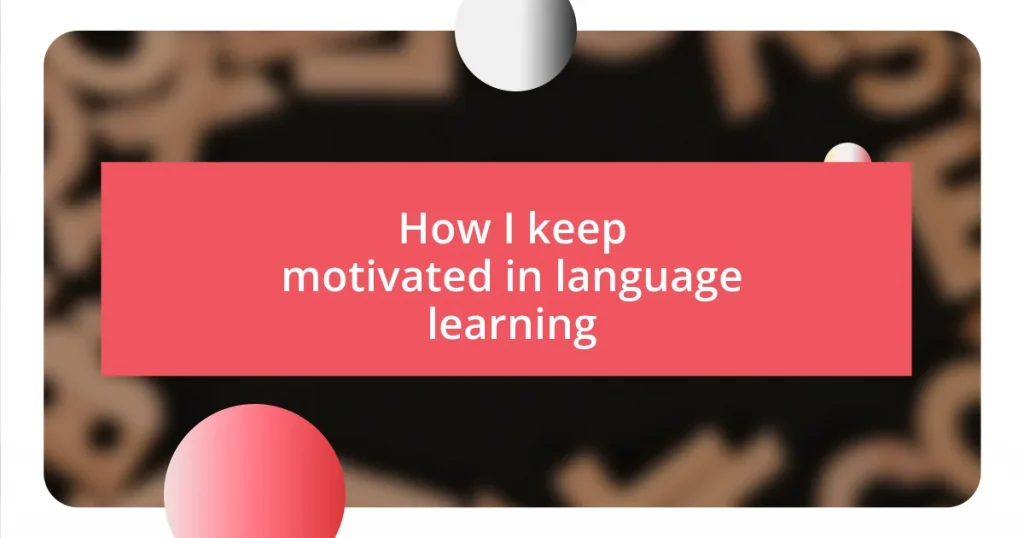Key takeaways:
- Understanding personal and external motivations enhances language learning, turning it into a joyful experience.
- Setting clear, achievable goals and visualizing success keeps motivation high and learning structured.
- Engaging with communities and tracking progress fosters connection and encourages celebration of achievements, reinforcing a positive learning environment.
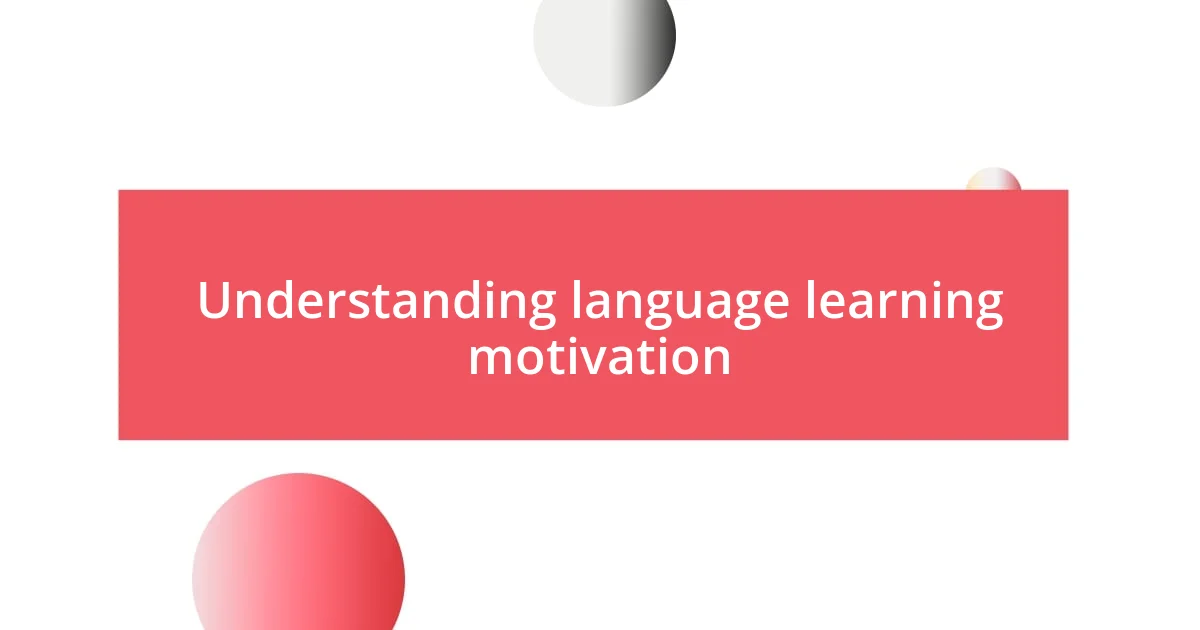
Understanding language learning motivation
Understanding what drives us in language learning can be a game-changer. For me, the thrill of connecting with new people and their cultures often fuels my motivation. I still remember the first time I had a conversation in Spanish—there was this electric moment when I realized I could express my thoughts and understand someone’s story. Isn’t it incredible how language opens up a whole new world?
Every learner has unique motivations, and discovering yours is essential. I often ask myself, “What do I truly enjoy about this process?” For instance, my love for music pushed me to learn French, so I could sing along with my favorite artists and understand the lyrics. It’s fascinating how intrinsic motivations like personal interests can transform learning into a joyful experience rather than a chore.
However, external motivations also hold their importance. I recall preparing for a trip to Japan; the thought of navigating a new place by speaking the language excited me. It’s a perfect example of how setting clear goals can ignite passion—do you have a dream destination that’s inspired you to learn? By intertwining personal and external motivations, I’ve created a balanced approach to my language learning journey.
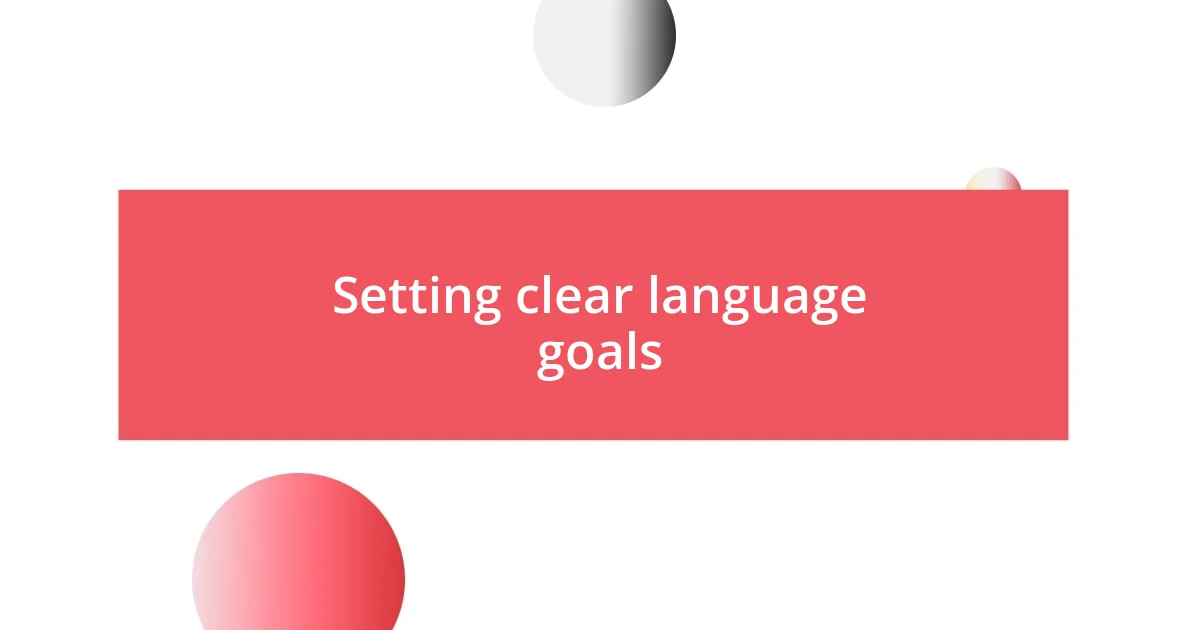
Setting clear language goals
Setting clear language goals has been pivotal in my journey as a language learner. I’ve always found that having specific objectives, like mastering 50 new vocabulary words per week or being able to hold a five-minute conversation, gives me a joyful sense of purpose. Each time I tick off a goal, it feels like a mini-celebration, reinforcing my motivation to continue.
In my experience, it helps to break down larger goals into manageable pieces. For instance, when I decided to become conversational in German, I didn’t just aim for fluency right away. Instead, I set smaller milestones, like discussing my daily routine or ordering food in a restaurant. Reaching these smaller goals not only made learning feel less overwhelming but also provided a steady stream of achievements that kept my enthusiasm alive.
I also believe in visualizing the bigger picture to keep my motivation high. When I studied Italian, I pictured myself savoring gelato in Rome while chatting with locals. This vivid imagery made my goal feel tangible and exciting, driving me to push through tough learning phases. What kind of images inspire you to set and achieve your language goals? The answers might surprise you.
| Goal Type | Example |
|---|---|
| Short-term | Learn 20 new words and use them in sentences |
| Intermediate | Hold a 10-minute conversation with a native speaker |
| Long-term | Be able to read a novel in the target language |
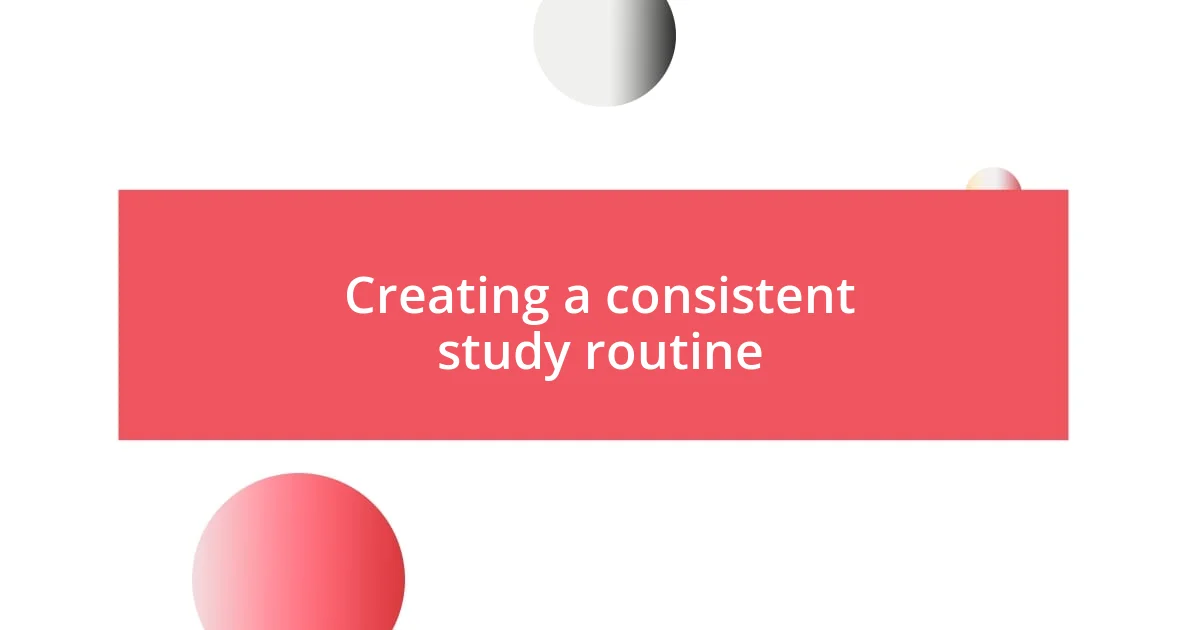
Creating a consistent study routine
Creating a study routine is like finding the rhythm of your favorite song—it sets the tone for the entire learning experience. For me, consistency has been key. I usually dedicate a specific time each day to study, whether it’s early in the morning or right before bed. I’ve noticed that this regularity not only builds a habit but also makes the learning process feel like a natural part of my day, rather than an obligation.
To create a consistent study routine, here are some practical tips that have worked for me:
- Set a specific study time: Choose a time when you feel most alert and focused.
- Stick to a location: Having a designated study spot can cue your brain that it’s time to learn.
- Short sessions are effective: I often study in small 20-30 minute bursts rather than long, draining hours, which keeps my mind fresh.
- Use reminders: I set alarms or calendar invites to remind me of my study sessions, helping keep me accountable.
- Make it enjoyable: I incorporate fun activities, like watching shows or listening to music in my target language, to keep my routine vibrant.
Balancing variety with consistency has been invaluable. I ensure that each week I include different types of activities—writing, speaking, and listening—to avoid monotony. I recall one week when I immersed myself in a Spanish podcast. It was refreshing and revitalized my passion. I held a mini celebration afterward, sharing my new insight with a friend, which made the experience even richer. That’s the beauty of a routine: it doesn’t become a chore when you infuse it with excitement and personal relevance. What little adjustments could you make to find your rhythm in language learning?
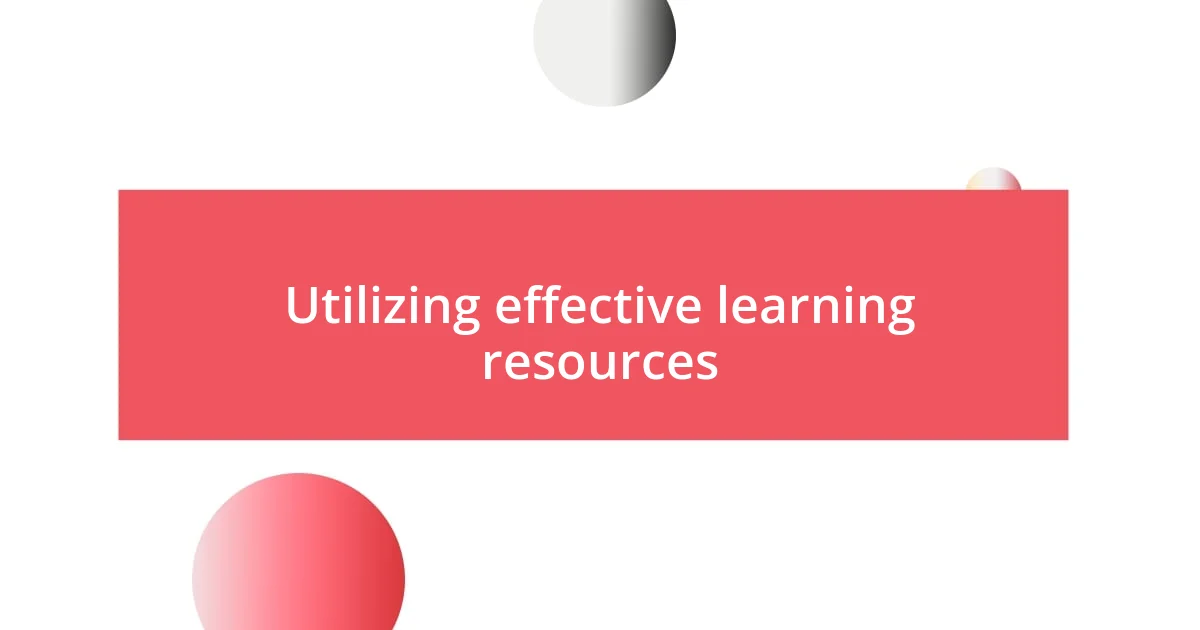
Utilizing effective learning resources
Utilizing effective learning resources has played a vital role in keeping my motivation alive. There’s a certain thrill in discovering resources that resonate with me; for example, I stumbled upon an interactive language app that turns vocabulary practice into a game. The competitive element makes me eager to get back to it daily—who doesn’t love leveling up their skills while having fun?
I also lean heavily on authentic materials like films and podcasts in my target language. Watching a romantic comedy in French or listening to a Spanish music playlist isn’t just entertaining; it becomes a part of my learning process. I remember laughing out loud during a hilarious scene that led me to look up new phrases. These experiences create a connection that mere textbooks often miss. Have you ever laughed while learning a new phrase? That joy can be incredibly motivating.
Moreover, I’ve found language exchange partners to be invaluable resources. Engaging with native speakers is not just about practicing my language skills; it’s about building relationships and learning about diverse cultures. I’ve had some profound conversations with friends I met through language exchange platforms. These discussions have fueled my passion and made every study session feel like a step closer to understanding a world beyond just words. What intriguing connections could you forge through language learning?
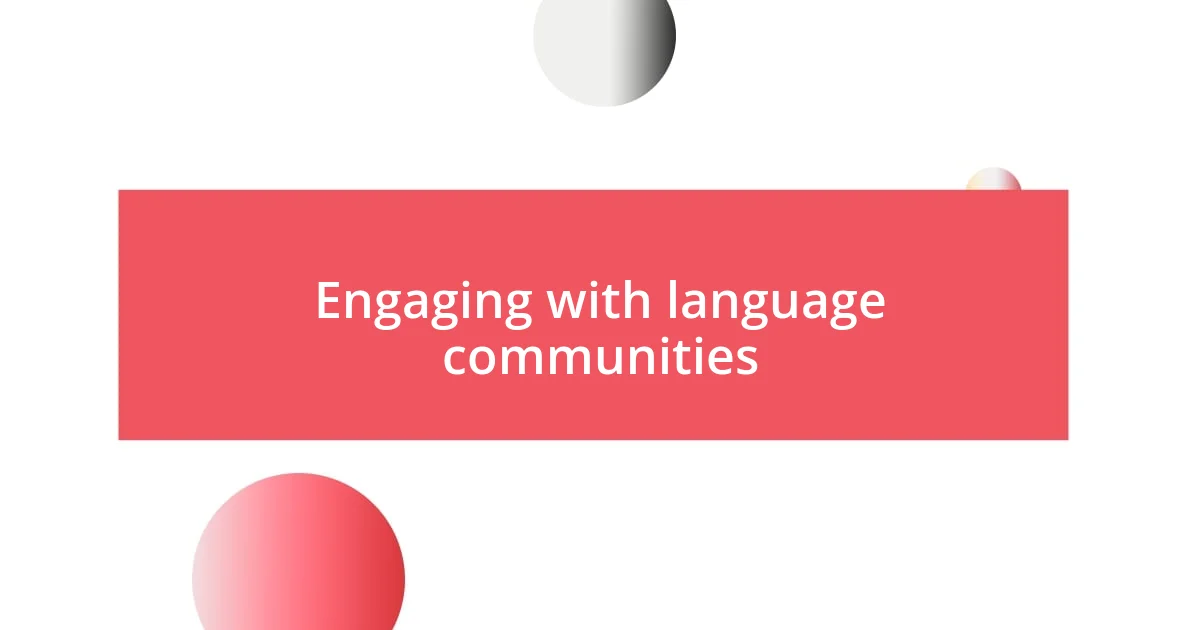
Engaging with language communities
Connecting with language communities has been a game changer for my learning journey. I remember the first time I joined an online forum dedicated to Japanese learners. It felt like stepping into a vibrant marketplace of ideas and experiences. The sense of belonging that emerged from discussing grammar nuances and sharing cultural tidbits was inspiring. Have you found a community that energizes your learning process?
Attending local meetups or conversation clubs has also contributed significantly to my motivation. The first time I walked into a Spanish language meetup, I felt a delightful mix of exhilaration and nervousness. But once I started chatting with others, the energy was contagious. It was enchanting to see how many people were just as eager to learn and grow alongside me. I recall laughing together over our shared struggles with difficult verb conjugations—it created an instant bond. Isn’t it fascinating how learning can turn strangers into friends?
Finally, immersing myself in social media groups dedicated to language learning has been a treasure trove of inspiration. I often scroll through posts that highlight daily challenges and victories. A member once shared a video of their language progress, and it rekindled my own enthusiasm instantly. It made me think, “If they can do it, so can I!” These communities remind me that motivation thrives in shared experiences. What stories or insights might you uncover by tapping into these vibrant networks?
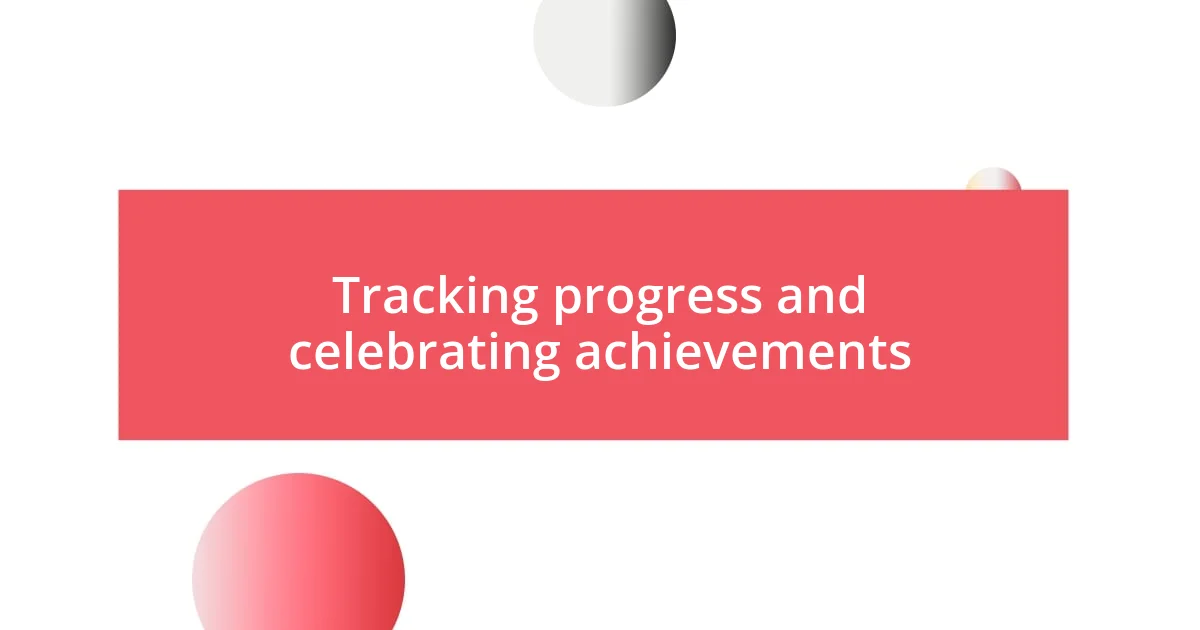
Tracking progress and celebrating achievements
Tracking my progress in language learning has proven to be crucial in maintaining my motivation. I keep a colorful journal where I jot down new vocabulary, grammar points, and even reflections on lessons learned. Just recently, I flipped back to an entry from a few months ago, and it was enlightening to see how much I’d grown. Each little note feels like a landmark in my journey, reminding me that the effort I put in is tangible. Have you ever revisited your earlier notes to appreciate your progress?
Celebrating achievements, no matter how small, has a significant impact on my motivation. I remember reaching a milestone when I finished my first book entirely in German. It wasn’t a huge bestseller, but the excitement I felt after closing those pages made me want to celebrate with friends. I treated myself to a cozy dinner and shared my triumph, and their genuine excitement fueled my drive to tackle the next challenge. What celebrations could invigorate your language-learning journey?
Incorporating a reward system has transformed the way I view setbacks and successes. Whenever I complete a set of comprehensive exercises or ace a practice test, I indulge in something special—a favorite snack or a mini-movie night in my target language. This approach creates a positive reinforcement cycle, reminding me that each effort is worthwhile. I’ve found that associating enjoyment with my achievements keeps the language-learning experience vibrant. What small rewards could you integrate into your process for an added motivational boost?










